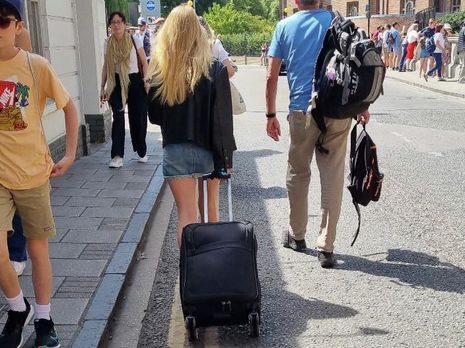Selling the Cambridge experience: private summer programmes in the historic university
Emma Tenzler explores the realities of privately provided summer programmes in Cambridge and the influence they exercise on the academic trajectories of their participants

Just days after the final few Cambridge students leave for the holidays, a cluster of new, younger faces stare up at the medieval buildings and cobbled alleys of Cambridge in awe. Every summer, hundreds of high school students settle into the empty colleges, stroll along King´s Parade, now devoid of its university bustle, and make Cambridge their own. At least for two weeks.
Attracted by its reputation for academic excellence, several private firms specialise in organising exclusive summer programmes in Cambridge city centre. These programmes sell more than just education. They sell the experience of Cambridge – at a hefty price. While it is important to stress that there is no official affiliation between the University of Cambridge and these private programmes, several student participants shared how the University’s role as a backdrop for their summer schools were inextricable from their overall experiences. For them, the programmes made real an academic institution that had previously seemed abstract, and all too distant.
“The programmes made real a place which had previously seemed abstract, and all too distant”
Immerse Education and Reach Cambridge are among the numerous private providers offering residential programmes in Cambridge to school children from around the world. The students, aged 13 or 14 to 18, are hosted in college accommodation, and often supervised and taught by university undergraduates and PhD students. Beyond their academic provisions, these programmes offer a taste of Cambridge – for those who can afford the fees. The standard two-week residential programme offered by Immerse costs £6,995, while Reach has priced its own at £6,295. While scholarships exist, most participants pay for the opportunity to learn in Cambridge.
The participants learn in Cambridge, but not with Cambridge. Lauren Pilley, a spokesperson for Immerse Education, is immediately keen to stress that Immerse is “not affiliated with the University”. Nor do its relations with the colleges in which its programmes are hosted transcend the contractual: “we simply hire their facilities”. The creation and implementation of academic and social summer programs rest solely with Immerse, and “there is no way in which the University or colleges exert influence over, or set guidelines for, the summer programmes”.
Lauren further explains how the programs seek to “provide a broader academic and personal development experience,” rather than just preparation for future Oxbridge applications. Yet the residential summer programmes cannot be severed from the University completely. While there is “no formal requirement for our Cambridge tutors or mentors to be from the University,” Lauren tells me that the need for on-sight presence and local knowledge means that “many of our Cambridge staff are studying or have studied at the University”.
The University doesn’t only lend its staff and students to summer programs. It also offers its reputation to privately provided summer programmes; proximity to an esteemed university is a key reason for many students’ participation. “I chose to attend the Immerse programme in Cambridge mainly because of the university’s reputation,” Zihan, a high school student from Ireland who attended the Immerse summer program for architecture in 2022, tells me. While she found the academic aspect of the program “unchallenging” and “a bit surface level,” her decision to apply to study architecture at Cambridge, while “ultimately determined by the university’s reputation,” was “influenced a bit…by the summer course” that had enabled her to briefly bridge the distance.
“Proximity to an esteemed university is a key reason for many students’ participation”
“I chose to attend in order to gain exposure to the university lifestyle,” Tamara, a high school student from the Middle East, recounts. Tamara, who attended the Immerse summer school in medicine in 2022, shares Zihan’s view that her career goals strongly motivated her to take part in the programme: “I would like to study dentistry in the future, a very competitive course, so I felt that taking part in a summer programme would be very beneficial exposure for me”. Unlike Zihan, she will not apply to Cambridge as it, “does not offer the course I want to do”. Nevertheless, Tamara believes the course “still offered a great purpose” as she is applying to other UK universities. She concludes: “I feel like I am much more drawn to UK universities after my time at the summer school as I loved the environment and people”.
Residential programmes can familiarise a city, a university, and a country that are alien to the many international participants. A spokesperson for Reach Cambridge goes as far as identifying the promotion of internationalism as the core aim of the institution: “at a time when […] the presence of international students at some higher education settings internationally is under threat, we are proud of our diverse community of international students spanning over 60 countries”. Residential programmes can bridge the gap between international students (who can afford the fees) and UK institutions, and, ultimately, help foster “international understanding,” the spokesperson claims. Zihan and Tamara would probably agree.
At the end of every summer, hundreds of high school students from across the world leave Cambridge. They leave the colleges they briefly called their own, they leave the city they experienced through guided tours, and they leave the University that became real to them through the catered programs hosted within it. Many encountered the country and the city for the first time. Some will return.
 News / Judge Business School advisor resigns over Epstein and Andrew links18 February 2026
News / Judge Business School advisor resigns over Epstein and Andrew links18 February 2026 News / Hundreds of Cambridge academics demand vote on fate of vet course20 February 2026
News / Hundreds of Cambridge academics demand vote on fate of vet course20 February 2026 News / Petition demands University reverse decision on vegan menu20 February 2026
News / Petition demands University reverse decision on vegan menu20 February 2026 News / CUCA members attend Reform rally in London20 February 2026
News / CUCA members attend Reform rally in London20 February 2026 News / Gov grants £36m to Cambridge supercomputer17 February 2026
News / Gov grants £36m to Cambridge supercomputer17 February 2026










